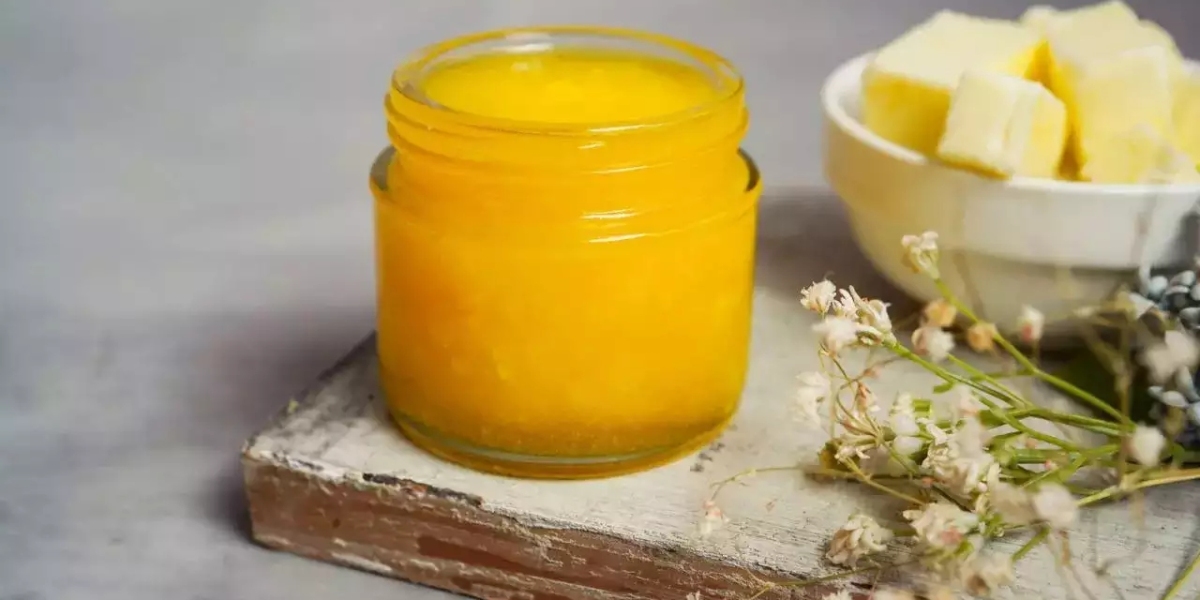Desi ghee, the golden, fragrant clarified butter made from cow or buffalo milk, holds a special place in the culinary and cultural traditions of Pakistan. It's been used for centuries in Pakistan's kitchens for everything from cooking to religious rituals. Its rich taste, nutritional value, and deep connection with the country’s heritage make desi ghee a cherished ingredient. However, like many other food products, the price of desi ghee in Pakistan fluctuates and is an important aspect for consumers to consider. In this blog post, we will explore the role of desi ghee in Pakistani cuisine, its health benefits, and factors affecting the desi ghee price in pakistan.
What is Desi Ghee?
Desi ghee is essentially clarified butter that is derived by simmering cow or buffalo milk and separating the fat from the milk solids and water. The resulting product is a rich, golden fat that is free of impurities, with a high smoke point, which makes it ideal for cooking. Desi ghee has a distinct, nutty flavor that cannot be matched by other cooking fats. It is widely used in Pakistani homes for frying, roasting, or even for making sweets such as mithai.
Unlike regular butter, which can have a creamy consistency and lower shelf life, desi ghee is firmer and can be stored for longer periods without refrigeration due to its high fat content and lack of moisture.
The Cultural Significance of Desi Ghee
Desi ghee holds cultural significance beyond its culinary use in Pakistan. For generations, ghee has been associated with wealth, health, and purity. It is used in various religious rituals and ceremonies, such as the lighting of lamps during festivals, prayers, and auspicious occasions. It is also an essential element in traditional medicine, particularly in Ayurveda, where it is believed to have many healing properties.
In Pakistani homes, ghee is considered a symbol of warmth and hospitality. It is served generously during family gatherings, weddings, and festive meals. Whether it’s the paratha or roti cooked with ghee or the rich gravies and biryani made with it, desi ghee infuses a rich taste into the food that is unforgettable.
Nutritional Benefits of Desi Ghee
Desi ghee is often hailed for its health benefits when consumed in moderation. Here are some of the key nutritional benefits of desi ghee:
Rich in Healthy Fats: Unlike refined oils, desi ghee contains a balance of healthy fats, such as omega-3 fatty acids and conjugated linoleic acid (CLA), which are beneficial for heart health.
High Smoke Point: With a smoke point of around 485°F (250°C), desi ghee is ideal for high-temperature cooking. This makes it a safe choice for frying and sautéing without releasing harmful compounds like some other oils.
Improves Digestion: Ghee has been known to improve digestion and support the absorption of fat-soluble vitamins like A, D, E, and K. It also promotes the secretion of bile, which helps digest fats efficiently.
Rich in Antioxidants: Ghee contains butyrate, a short-chain fatty acid that has anti-inflammatory properties and is thought to help reduce the risk of chronic diseases like cancer and heart disease.
Supports Skin Health: Desi ghee is often used in traditional remedies for improving skin health. Its moisturizing and nourishing properties make it ideal for treating dry skin and even soothing skin rashes.
While desi ghee is rich in fats, the key is moderation. Used in the right amounts, desi ghee can be a highly nutritious addition to your diet.
Desi Ghee Price in Pakistan: An Overview
The price of desi ghee in Pakistan has been a topic of concern for many households. In recent years, several factors have contributed to fluctuations in the price of ghee. These factors include inflation, supply chain issues, increased production costs, and government policies regarding food importation and taxation.
Current Trends in Desi Ghee Prices
The price of desi ghee in Pakistan can vary greatly depending on the brand, the type of milk used (cow or buffalo), and the region in which it is sold. On average, the price of desi ghee can range between PKR 500 to PKR 1000 per kilogram. However, premium brands and organic varieties can be priced higher, sometimes reaching PKR 1200 or more per kilogram.
Factors Affecting Desi Ghee Price in Pakistan
Milk Prices: Since desi ghee is made from milk, fluctuations in the price of milk directly affect the price of ghee. Any increase in the cost of dairy products, such as cow or buffalo milk, leads to an increase in the production cost of desi ghee.
Production Costs: Desi ghee is a labor-intensive product. The process of making ghee involves slowly heating milk, removing impurities, and then clarifying it into ghee. The cost of labor, fuel, and other ingredients like salt or spices can add to the final price.
Inflation and Economic Conditions: Pakistan has faced inflationary pressures in recent years, impacting the overall cost of goods and services. The price of ghee, like many other food products, is affected by the general rise in prices of raw materials, transport, and manufacturing.
Import Duties and Taxes: Some brands of desi ghee are imported from countries like India. Import duties, taxes, and tariffs on such products can raise their prices. Local brands that are made from locally sourced milk might be more affordable, but still subject to changes in economic conditions.
Branding and Packaging: Like any other consumer product, the price of desi ghee can also be influenced by branding, packaging, and marketing strategies. Premium packaging and marketing may lead to higher prices for well-known brands, whereas smaller local brands may offer ghee at a more affordable price.
Demand and Supply: The demand for desi ghee in Pakistan remains strong, especially in rural areas, where it is still a staple in traditional cooking. However, supply chain disruptions, especially in the case of seasonal shortages of milk or ghee production, can lead to price hikes.
How to Save on Desi Ghee in Pakistan?
Buy in Bulk: Purchasing larger quantities of desi ghee can save money in the long run, as bulk prices are generally lower than buying smaller containers.
Compare Prices: Prices can vary depending on the brand and store. It’s important to compare prices at local markets, grocery stores, or online platforms before making a purchase.
Look for Discounts: Keep an eye out for discounts and sales. Many retailers offer promotions during festivals or special occasions, which can be a good time to stock up on desi ghee.
Consider Local Brands: While international brands may be more expensive, local Pakistani brands can provide good quality ghee at a more affordable price.
Conclusion
Desi ghee remains an essential part of Pakistani cooking, celebrated not only for its rich taste and texture but also for its numerous health benefits. While the price of desi ghee in Pakistan has been fluctuating, it remains an integral part of the food culture. By understanding the factors influencing its price, consumers can make informed choices about purchasing ghee while still enjoying its many advantages. Whether you are making traditional dishes like halwa or adding a dollop of ghee to your daily rotis, this golden fat continues to enrich the flavors of Pakistan’s kitchens.






